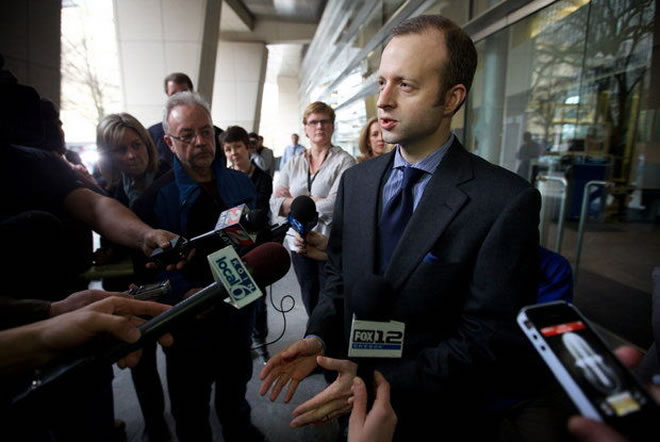
Lead federal prosecutor Ethan D. Knight speaks with reporters after a federal jury found Mohamed Osman Mohamud guilty in January 2013 of attempting to detonate a bomb during Portland's 2010 holiday tree-lighting ceremony. Knight now says the prosecution in the case should not have to turn over more information to Mohamud's defense team. (Randy L. Rasmussen/The Oregonian)

By Helen Jung
Saturday, February 15, 2014
Federal prosecutors contend that a judge should reject a request from Mohamed Mohamud’s lawyers for a sweeping range of information, saying they have already shared all that they are legally required to.
“There is no new evidence in this case,” Assistant U.S. Attorney Ethan Knight wrote in his filing on Thursday, defending the government’s disclosures of how it collected evidence in its investigation of Mohamud.
The Somali-born teenager was convicted last January of trying to detonate a bomb – a fake provided by undercover agents -- at Pioneer Courthouse Square on Nov. 26, 2010, during the city's annual Christmas tree lighting ceremony.
Knight’s response comes after Mohamud’s lawyers filed a request last month demanding internal government documents related to their surveillance of him, arguing that the government failed to alert them to an intelligence gathering method that may have tainted Mohamud's trial.
Although the government disclosed at the time of Mohamud’s November 2010 indictment that investigators used electronic and physical methods of obtaining evidence under the Foreign Intelligence Surveillance Act, it did not reveal until last fall that some information also resulted from use of warrantless wiretaps overseas, a controversial mechanism that was authorized under amendments to FISA in 2008.
That belated disclosure of the use of warrantless wiretaps overseas does not reflect "willful misconduct," Knight wrote, pushing back against suggestions of prosecutorial wrongdoing. In fact, prosecutors were following U.S. Justice Department protocol at the time.
But last year – after Mohamud’s trial, the Justice Department revised its policies regarding disclosure in FISA-intelligence cases, issuing alerts when investigative material was derived from intercepting foreign communications, he wrote.
Knight also argued that the defense does not need the information it is requesting in order to challenge the constitutionality of the warrantless wiretaps provision; nor to challenge whether evidence should not have been introduced in trial. If they can show the judge that evidence derived from these wiretaps should not have been introduced, they can secure a new trial for Mohamud, he wrote.
In pushing for access to classified government documents, the defense noted that the national debate over intelligence gathering was sparked by former National Security Administration contractor Edward Snowden’s revelations of the agency’s massive collection of phone call logs. They argued such concerns merit a close look at whether Mohamed was fairly prosecuted.
But Knight said the defense is asking for information that is largely irrelevant to the warrantless wiretaps provision and is the based on speculative theories on the government's conduct.
The federal public defender’s office is expected to file its reply to the government's response by Feb. 27.